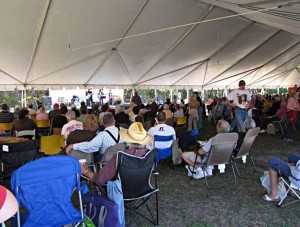In light of the two most recent posts (on atheism’s weakness as philosophical movement and my inability to rebut a Ross Douthat thought experiment), it’s about time I got around to discussing the keynote at the DC Center for Inquiry fundraiser I attended a few weeks back.
The featured speaker was Greta Christina and she spoke on the similarities between New Atheism and the LGBT movement. I’m sure you can think of plenty of them already: both distrusted groups that are numerically in the minority. Both movements that put a big emphasis on coming out because if people know us personally, they tend to soften some of their judgments. Both movements with fierce internal debates about how to engage with the mainstream and prone to worry about accommodationists.
I could guess most of the above, but Greta had another parallel that really caught my attention. There have been historical periods where being publicly known as queer or atheist could put you in serious danger. And in some parts of the world, and the United States, that is still the case. But what Greta chose to focus on was what changes once it’s safe to be queer or to be an atheist.
It used to be that being out, whether as LGBT or as an atheist, was a good proxy variable for having a lot of spunk and for having put a lot of thought into the issue. But today, being out is low-cost for a lot of people. I grew up atheist on very secular Long Island and didn’t have to a lot of heavy lifting to defend my beliefs. Just knowing I’m an atheist doesn’t give you that much help in guessing how smart I am or how well I can defend what I believe.
Greta Christina explained that a strong sense of exceptionalism persisted in the LGBT community, even when many queer folks could exist comfortably within the mainstream. And in a movement like atheism, where a lot is made of being less wrong than other people, this kind of confidence and complacency can be dangerous.
Atheism isn’t the goal. The goal is to have a correct-as-possible model of the world to guide our actions, and we believe atheism is one of the components of that map. But if plenty of people can stumble into atheism, we need to do more to focus on the process of rational inquiry, not just celebrate it’s byproducts.
Someone in the comments section of my response to R. Hoffman asked who my favorite atheists were. Among living atheists, I’d definitely say Eliezer Yudkowsky fits the bill.












